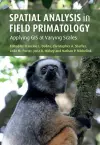
Spatial Analysis in Field Primatology
5 contributors - Hardback
£99.99
Francine L. Dolins is an Associate Professor of Comparative Psychology at the University of Michigan-Dearborn, USA. Her research investigates spatial cognition, navigation and foraging behavior with nonhuman primates in the lab using virtual reality, and also conducts field research, to integrate the understanding of species' cognitive capacities with socio-ecological factors. She has published two edited books with Cambridge University Press: Attitudes to Animals: Views in Animal Welfare (1999); and Spatial Cognition, Spatial Perception: Mapping the Self and Space (2010). Christopher A. Shaffer is Assistant Professor of Anthropology at Grand Valley State University, Michigan, and Principal Investigator of the Konashen Ecosystem Health Project. His primary research and teaching interests focus on community ecology and behavioral ecology, particularly in the context of human-nonhuman animal interactions and natural resource management. Leila M. Porter is Professor of Anthropology and Presidential Engagement Professor at Northern Illinois University. She studies the behavior and ecology of tamarins and Goeldi's monkeys in South America, specifically their diet, ranging, and patterns of infant care. Jena R. Hickey served as the Conservation Scientist for the International Gorilla Conservation Programme (IGCP) for 5 years. With over 20 years of professional experience, Jena has held positions with state and federal agencies, academic institutions, and not-for-profit organizations. She focuses on species occurrence, abundance, spatial distributions, movements, and habitat use, as well as how anthropogenic factors shape these response variables. Nathan P. Nibbelink is Professor of GIS and Spatial Ecology in the Warnell School of Forestry and Natural Resources, University of Georgia. He serves as Director of the Center for Integrative Conservation Research and the Integrative Conservation Ph.D. program. His research uses spatially explicit models to address landscape connectivity in a changing world, and to inform conservation and management of species and ecosystems.